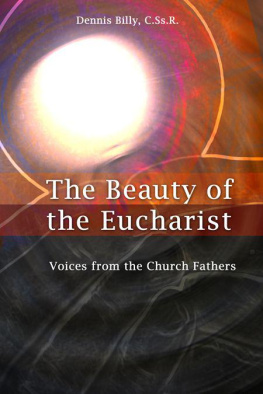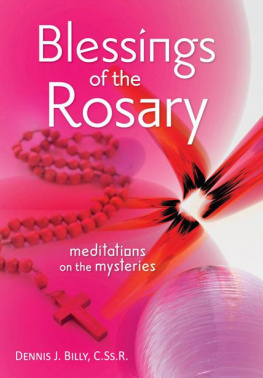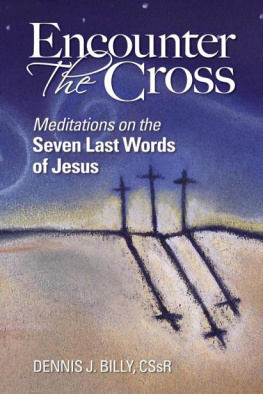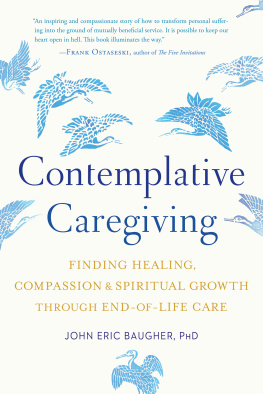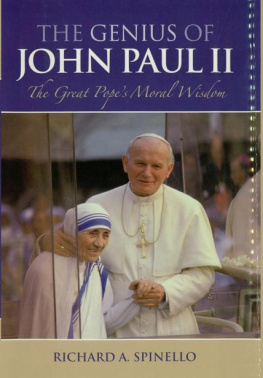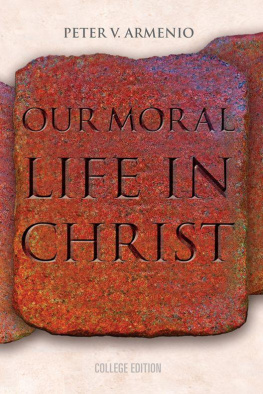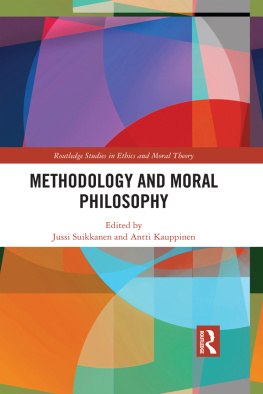Contemplative Ethics
An Introduction
Dennis J. Billy, CSsR

Paulist Press
New York/Mahwah, NJ
The Scripture quotations contained herein are from the New Revised Standard Version: Catholic Edition Copyright 1989 and 1993, by the Division of Christian Education of the National Council of the Churches of Christ in the United States of America. Used by permission. All rights reserved.
Cover design by Lynn Else
Copyright 2011 by Dennis J. Billy
All rights reserved. No part of this book may be reproduced or transmitted in any form or by any means, electronic or mechanical, including photocopying, recording, or by any information storage and retrieval system without permission in writing from the Publisher.
Library of Congress Cataloging-in-Publication Data
Billy, Dennis Joseph.
Contemplative ethics : an introduction / Dennis J. Billy.
p. cm.
Includes bibliographical references.
ISBN 978-0-8091-4680-2 (paperback) EISBN 978-1-58768-321-3 (e-book)
1. Christian ethicsCatholic authors. I. Title.
BJ1249.B49 2011
241.042dc22
2010038012
Published by Paulist Press
997 Macarthur Boulevard
Mahwah, New Jersey 07430
www.paulistpress.com
In fond memory of my confrere, good friend, and classmate Pasquale Tremonte, CSsR (19292005)
Duc in altum
Put out into the deep water
Luke 5:4
Duc in altum! These words ring out for us today, and they invite us to remember the past with gratitude, to live the present with enthusiasm and to look forward to the future with confidence. Jesus Christ is the same yesterday and today and forever (Heb 13:8).
Pope John Paul II
Contents
Earlier versions of material in this book have appeared elsewhere under the following titles:
What Is Contemplative Ethics? Josephinum Journal of Theology 13 (2006): 216 [Chapter One].
Contemplating the Eternal Word, Josephinum Journal of Theology 13 (2006): 20922 [Chapter Two].
Contemplating the Incarnate Word, Josephinum Journal of Theology 14 (2007): 4557 [Chapter Three].
Contemplating the Life and Ministry of Christ: Emerging Guidelines for Christian Living, Studia moralia 46 (2008): 43353 [Chapter Four].
In recent years, Catholic moral theologians have written a number of studies on the connection between their discipline and Christian spirituality. Although these works have provided great insights into the general contours of this relationship, they have not gone very far into particulars.
A few years ago, I took a small step in remedying this situation by looking at the relationship between conscience and prayer in the Catholic spiritual moral tradition. These collaborative efforts with James Keating were well received and managed to bring a deeper level of theological discourse to the discussion about the relationship between spirituality and moral theology. They have also encouraged me to explore the particulars of this relationship still further.
In the present volume, I intend to probe the relationship between spirituality and moral theology from yet another perspective, this time by looking at the common ground shared by contemplation and the spiritual moral life. I hope to enrich both disciplines by showing how they can relate to one another on equal footing and in a genuine spirit of cooperation. In doing so, I seek to respond to the challenge put forth by the late Pope John Paul II to all the Catholic faithful to put out into the deep water (Duc in altum) as they navigate the waters of the new millennium.
Contemplation, for me, is a wordless, thoughtless pondering of an object in childlike wonder. We can contemplate just about anything: ourselves, other people, the world around us, even the divine mysteries. In the latter case, contemplation can be natural (acquired) or infused (mystical), depending on whether God is the primary or secondary agent involved. When I think of contemplation, I often envision a man or woman gazing in wordless silence upon an icon of Christ or the Blessed Mother. He or she does nothing but look upon the sacred representation in the hope of gaining a glimpse into the world beyond. Such a person seeks to commune with God, not on the level of thought, but of spirit. When gazing upon an icon in contemplative prayer, a person allows his or her spirit to cross the threshold of the sacred and commune with Gods Holy Spirit. This experience of union comes, not from a persons efforts, but from God as a gift. The person gazing, we might say, is also gazed upon by God, who uses the icon as a window through which the eye of what is infinitely sacred establishes contact with the eye of the soul.
Contemplation is not opposed to thought, but seeks a deeper level of it, the underlying unity beneath the myriad distinctions of rational discourse. It is born of solitude of heart and is sometimes the fruit of meditative prayer, where thoughts, images, and affections are ordered to God in a more quiet, reflective fashion. I also believe that moral theologians should bring this contemplative attitude into play in the work they do in service to the Church and to the world.
I have consciously selected the challenging and even provocative phrase contemplative ethics to describe this intimate relationship between Catholic moral theology and spirituality because of the unsettling (perhaps even disconcerting) effect it will probably have on those who still insist on separating the spiritual and moral spheres of human existence. Although it is a relatively recent phrase in the vocabulary of theological discourse, it represents a venerable and longstanding approach to the spiritual moral life in Catholic thought: one that values contemplation and learning as a true path to wisdom, and that values holiness of life as a means to the experiential knowledge of the divine. It is my belief that Catholic moral theology needs to retrieve this valuable and insightful approach to the spiritual moral life. If Catholic moral theology fails to incorporate a contemplative attitude toward life into its methodology, discourse, and way of thinking, it will in effect be disregarding the millions of believers today who want their reasons for acting to flow from the deep spiritual hungers of their hearts. The true depths of these hungers, I believe, are laid bare in the person of Jesus Christ. By contemplating his face and the mystery of his existence, we hope to gain insights into our own hearts and begin to understand what kinds of actions are both worthy and expected of us.
I have divided the book into six chapters, each of which focuses on a specific element of our study of contemplation and the moral life. In chapter 1, I examine the nature of contemplative ethics and develop a methodology that allows us to explore the anthropological dimensions of contemplative decision making. I then apply this contemplative methodology to the Eternal Word (chapter 2), the Incarnate Word (chapter 3), Jesus life and ministry (chapter 4), his suffering and death (chapter 5), and his risen life (chapter 6). Near the end of each chapter, I offer a variety of guidelines for the spiritual moral life that flow directly from this contemplative approach to the mysteries of Christ. Some of these guidelines resurface at later moments in the book, in much the same way that deeply rooted attitudes and ways of thinking influence us at not just one but many stages of our lives. As such, they represent recurrent themes or leitmotifs important to our contemplative approach to Catholic moral theology. To engage my readers on a still deeper level, I also offer a series of reflection questions under the title, Contemplating the Face of Christ, to help them ponder these mysteries and probe more deeply into their own attitudes about the nature of the spiritual moral life. At the end of each chapter, I also include a practical exercise entitled Following the Promptings of the Spirit, to provide my readers with some concrete suggestions on how they might deepen their experience of prayer and so live the Gospel on a deeper level of consciousness.
Next page

